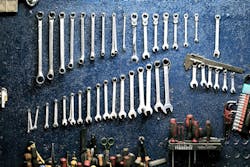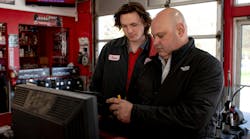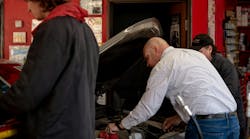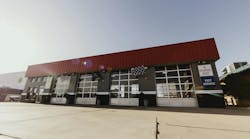Eric Frankenberger, president of Oil Changers in the San Francisco bay area, presented material on Oil Change Tech Tips at this year’s iFLEX event. He covered many topics ranging from preventing canister oil filter issues to dipstick design issues and beyond.
“In the oil change industry, you want your customers’ cars to last as long as they possibly can,” Frankenberger said. “If your customer wants to give their car to their grandkids, it’s important to help them do that.”
It’s also important to inspect for issues. Creating and following a process in everything you do in your shop is very important. Developing and following processes creates a more streamlined system and helps prevent issues from arising.
Here are some topics Frankenberger discussed during the presentation that we wanted to share with you.
Canister Oil Filter Housing Issues
Perform an internal and external inspection of the filter housing to discover possible issues.
“We’ve all seen the gasket in the wrong location, cracked canister caps or grit around the filter, and if you can take photos of what you see, they can benefit you,” Frankenberger said.
According to Frankenberger, you have to be proactive and tell customers when you see these problems. You can’t wait until you cash them out. It’s very important to document when you see something wrong. Train your staff to document issues that they see so you cover yourself from future problems.
Frankenberger’s Five Steps to Avoid Canister Oil Filter Issues
1. Make sure you have the gasket in the right place
2. Lubricate the gasket and the housing
3. Make sure there are no foreign materials around the filter, and make sure it’s clean
4. Use a torque wrench on your canister filters
5. Perform an elevated RPM check in the bay. Do not let the car leave the shop without getting it to 3,000 RPMs for about 10 seconds.
“Canister caps are like drain plugs. There are only so many times you can touch these caps before they break,” Frankenberger said. “Get with your vendor and make sure that you have extra caps available.”
General Skid Plate Issues
According to Frankenberger, there are multiple reasons that skid plates fail. Sometimes this happens due to plastic parts, wear and tear and sometimes they also just come lose. You can include a skid plate charge when they need to be replaced. He said, if there are parts that you’re seeing break and fall apart frequently, get with your vendor to make sure you have those parts on-hand in your shop. It’s also important to do a pull-down-test on skid plates. When you put it back on the customer’s car, pull down on it with your hand. If you can pull it down with your hand, it’s not secure, and you need to let the customer know and secure or replace it.
“It is better to have a skid plate come down in your shop than when your customer is driving down the highway,” Frankenberger said.
Dip Sticks
Too many manufacturers make dipsticks and their housings that are poorly designed, Frankenberger said. These poor designs sometimes cause things to wear down quickly and can fall apart in your hand upon removal. Be sure you are communicating with your customers.
“No, it may not be your fault that the part failed, but if it fell apart in your hand, you need to explain why. Most customers are going to understand, but a $10 part is not worth losing a customer that you worked so hard to gain in the first place,” Frankenberger said. “Make sure you’re taking care of your long-term customers. Sometimes it’s good to build your prices around these incidents so you’re not seeing the loss.”
You may also run into cracking and breaking issues with the radiator hoses and plastic radiator parts, Frankenberger warned. You have to work smart and safe around them. Make sure your technicians aren’t leaning on these parts. Aging plastic becomes brittle and even fails under normal use due to time and mileage. These parts are likely to break, so take your time and be thorough.
Mass air flow sensors are much more sensitive today than they have ever been. Many shops used to pull the air filter boxes off to clean them out for their customers.
“Do not put any pressured air inside of the box. The sensors are extremely hypersensitive and can be thrown off by a piece of dust,” Frankenberger warned.
Beware of Smart Keys
Frankenberger reminded operators to beware of smart key technology. Many shops have gotten into the habit of putting the car keys on top of cars while completing service on vehicles. The problem is, these cars will still start without the key actually inside the vehicle. The shop cashes out the customer, the customer gets into the car and drives off while the smart key is still on the roof of the car. The customer drives away, and the key flies off of the roof of the car somewhere down the road. The customer calls the shop later, when they can’t find their key, and tells the technician the keys were never given back to them. The shop then has to spend around $200-$300 to have a new smart key made.
“These keys aren’t cheap, so create key hooks or an organized system away from the vehicle and place the keys on it while completing service,” Frankenberger said.
Many shops used to put the keys in the door to avoid locking them in the car. You can’t do that anymore with the smart keys. Protect your shop and your technicians by ensuring costly mistakes like this don’t happen.
We hope that you have taken away some helpful tips from Frankenberger’s seminar highlights. There are so many moving parts in running a preventive maintenance shop. Incorporating effective processes to prevent loss and creating an organized space can make a huge difference in the efficiency of your business.





